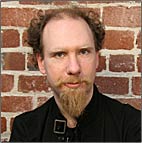What should V.2 of the Internet look like? #reinventthenet

What should Version 2 of the Internet look like?
And how should we get there?
IFTF Second Curve Internet Speaker Series with Peter Eckersley—January 27, 2015
![]() #reinventthenet [Powered by Ten-Year Forecast]
#reinventthenet [Powered by Ten-Year Forecast]
The Internet's core protocols—TCP, IP, DNS, HTTP, HTTPS—have served us very well for the past twenty to thirty years. But all of these protocols have limitations that are beginning to bite us in various ways. Because of these limitation, our global network is less secure, less reliable, and harder to innovate with.
In this talk, EFF Technology Projects Director Peter Eckersley gave a tour of these limitations, and reviewed some of the current efforts to upgrade the Internet's protocols to fix them. This included the newly announced Let's Encrypt certificate authority, which EFF is working on with Mozilla, Cisco, and Akamai, that aims to make HTTPS free and ubiquitous. It also includes an analysis of essential features of other efforts to upgrade TCP, IP, and DNS such as IPv6, DNSSEC, and QUIC, and the difficulties that Internet engineers face when they try to change the protocols used by a planet-wide network.
More About Peter
 Peter Eckersley is Technology Projects Director for the Electronic Frontier Foundation. He leads a team of technologists who watch for technologies that, by accident or design, pose a risk to computer users' freedoms—and then look for ways to fix them. They write code to make the Internet more secure, more open, and safer against surveillance and censorship. They explain gadgets to lawyers and policymakers, and law and policy to gadgets.
Peter Eckersley is Technology Projects Director for the Electronic Frontier Foundation. He leads a team of technologists who watch for technologies that, by accident or design, pose a risk to computer users' freedoms—and then look for ways to fix them. They write code to make the Internet more secure, more open, and safer against surveillance and censorship. They explain gadgets to lawyers and policymakers, and law and policy to gadgets.
Peter's work at EFF has included privacy and security projects such as Panopticlick, HTTPS Everywhere, SSDI, and the SSL Observatory; helping to launch a movement for open wireless networks; fighting to keep modern computing platforms open; and running the first controlled tests to confirm that Comcast was using forged reset packets to interfere with P2P protocols.
Peter holds a PhD in computer science and law from the University of Melbourne; his research focused on the practicality and desirability of using alternative compensation systems to legalize P2P file sharing and similar distribution tools while still paying authors and artists for their work. He is an affiliate of the Center for International Security and Cooperation at Stanford University.
About the Second Curve Internet Speaker Series
This event is part of IFTF’s Second Curve Internet Speaker Series, an exploration into the critical elements necessary to reinvent the Internet, stemming from our 2014 Ten-Year Forecast research. The series gathers leading minds together with IFTF’s deep experience thinking about technology and the ways of communicating, coordinating, and organizing in the changing world around us.
More Information
- For more information about the Second Curve Internet project and IFTF’s futures research, please contact Sean Ness (sness@iftf.org).
- Follow #reinventthenet, @IFTF, and like the IFTF Facebook page for more on reinventing the Internet!



